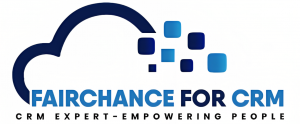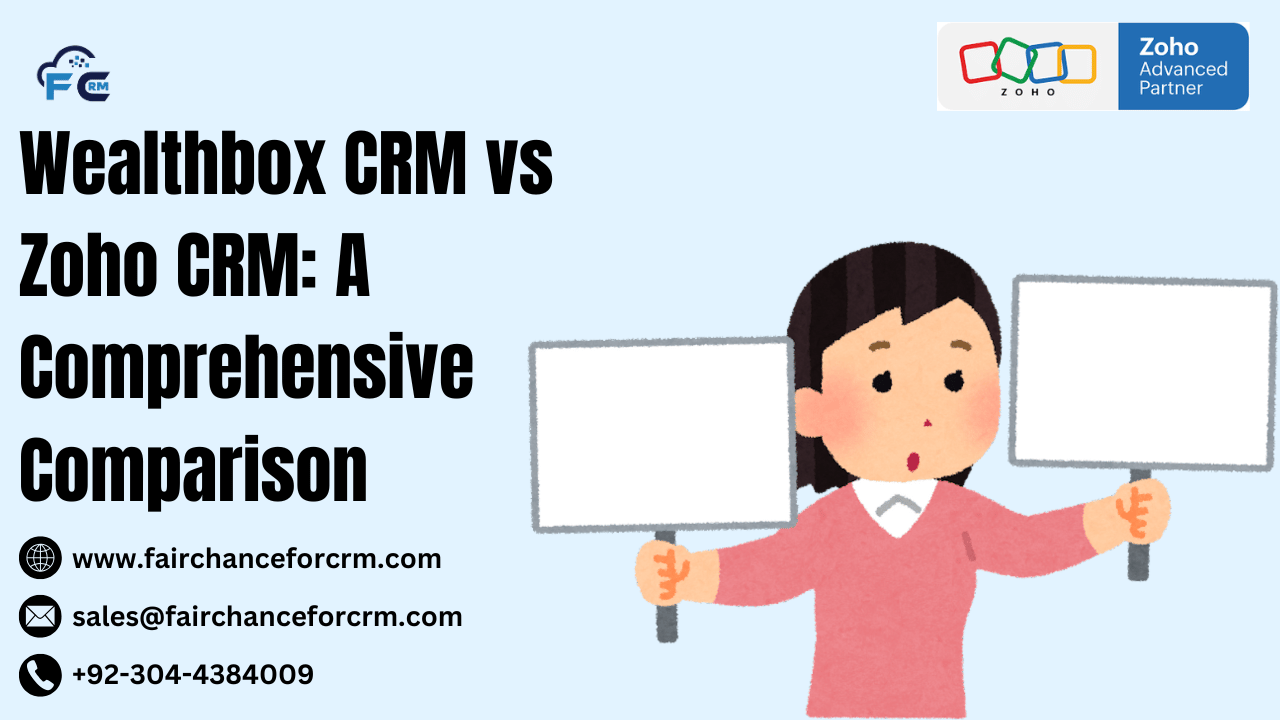When it comes to customer relationship management (CRM) software, businesses have a variety of options to choose from. Two popular solutions are Wealthbox CRM vs Zoho CRM, each with its own strengths, features, and pricing models. A thorough comparison between Wealthbox CRM and Zoho CRM will be given in this post, including topics like features, cost, usability, integrations, customer service, and more.
Also Read:
- HubSpot CRM vs Zoho CRM: A Comprehensive Comparison
- Understanding One-to-Many Relationship in Odoo: A Comprehensive Guide
- Odoo Backend: Features, Benefits, and Customization – Complete Guidance
- Zoho Search Records: The Ultimate Tool for Efficient Data Management and Retrieval
- Zoho Sign: The Ultimate Guide to Digital Signatures and Paperless Workflow
Overview of Wealthbox CRM vs Zoho CRM
Wealthbox CRM
Wealthbox CRM is a cloud-based CRM solution designed specifically for financial advisors, wealth management firms, and other professionals in the finance industry. It provides a simplified, intuitive user interface with an emphasis on customer relationship management, communication tracking, and workflow efficiency enhancement.
- Target Audience: Wealthbox CRM is tailored for financial advisors, wealth managers, and financial service providers.
- Key Features: Contact management, task automation, team collaboration, client relationship tracking, calendar, notes, and integrations with financial tools.
- User Interface: Wealthbox boasts a clean, intuitive design with a focus on simplicity and ease of use.
Zoho CRM
A feature-rich and adaptable customer relationship management tool, Zoho CRM is made for a variety of industries. It is well-known for being adaptable, scalable, and customizable, which makes it appropriate for companies of all sizes. Businesses can manage sales, marketing, customer service, and analytics on a single platform with the help of Zoho CRM’s extensive toolkit.
- Target Audience: Zoho CRM is designed for businesses across various industries, from small startups to large enterprises.
- Key Features: Email campaigns, reporting, workflow automation, mobile apps, lead and contact management, sales and marketing automation, and integrations.
- User Interface: Zoho CRM offers a more feature-dense interface that allows for deeper customization, but it can be more complex to navigate compared to Wealthbox.
Key Features Comparison – Wealthbox CRM vs Zoho CRM
Wealthbox CRM Features
- Client Management: Wealthbox CRM allows users to manage client profiles, track communications, and keep notes on important interactions.
- Workflow Automation: Automate tasks, reminders, and client follow-ups with simple workflow automation tools.
- Team Collaboration: Wealthbox CRM promotes team collaboration through shared tasks, notes, and activity tracking.
- Customizable Dashboards: Provides personalized views for each team member to track their daily tasks, client interactions, and business performance.
- Email Integration: Connects with popular email services for easy email tracking and communication with clients.
- Task and Event Management: Users can schedule tasks, meetings, and reminders, all integrated into their CRM workflow.
- Integrations: Integrates with popular financial tools and applications, such as Redtail, Schwab, and more.
Zoho CRM Features
- Lead & Contact Management: Zoho CRM offers detailed tracking and management of leads, contacts, and accounts.
- Sales Automation: Automates various sales processes, including lead scoring, assignment, nurturing, and email campaigns.
- Marketing Automation: Includes email marketing, social media integrations, and customer journey mapping to streamline marketing efforts.
- Reporting & Analytics: Advanced reporting capabilities to track sales performance, customer interactions, and KPIs in real-time.
- Customization: Highly customizable with options to create custom fields, modules, and workflows.
- Omnichannel Support: Provides multichannel support, including phone, email, social media, and live chat for customer service teams.
- AI Integration: Zoho CRM features an AI assistant called Zia, which provides data-driven insights, automates tasks, and helps optimize sales strategies.
- Mobile App: Fully functional mobile app for iOS and Android that allows users to access CRM features on the go.
- Integrations: Zoho CRM offers a vast number of integrations with third-party tools, including G Suite, Microsoft 365, Zapier, and various industry-specific apps.
Ease of Use – Wealthbox CRM vs Zoho CRM
Wealthbox CRM
Wealthbox CRM is known for its simple and intuitive interface, making it easy for financial professionals to get started and adopt the system quickly. The layout is clean, with a focus on the essential features that financial advisors need, such as client communication tracking and task management. This ease of use helps to minimize the learning curve for new users.
Zoho CRM
While Zoho CRM is feature-rich and powerful, its interface can be more complex and may take longer to learn, especially for users who aren’t familiar with CRM systems. However, Zoho CRM offers extensive customization options, so businesses that need highly tailored workflows can configure the system to their exact requirements. For those who need simple solutions, Zoho CRM might feel overwhelming at first.
Pricing Comparison – Wealthbox CRM vs Zoho CRM
Wealthbox CRM Pricing
Wealthbox offers a straightforward pricing model with the following plans:
- Free Plan: Limited to 2 users, this plan offers basic CRM features such as contact management and task tracking.
- Professional Plan: $60 per user/month (billed annually). Includes all the key features like workflow automation, integrations, and customizable dashboards.
- Enterprise Plan: Custom pricing. This plan includes advanced customization, enhanced support, and additional features tailored to large teams and organizations.
Zoho CRM Pricing
Zoho CRM offers a tiered pricing structure, with more features unlocked at each level:
- Free Plan: Available for up to 3 users with basic CRM features.
- Standard Plan: $14 per user/month (billed annually). Includes basic sales automation, email marketing, and reporting.
- Professional Plan: $23 per user/month (billed annually). Adds features like workflow automation, inventory management, and sales forecasting.
- Enterprise Plan: $40 per user/month (billed annually). Offers advanced features such as AI-powered sales insights, advanced analytics, and custom dashboards.
- Ultimate Plan: $52 per user/month (billed annually). Includes all features and enhanced support.
Pricing Summary
- Wealthbox CRM: Starts at $60 per user/month.
- Zoho CRM: Starts at $14 per user/month, with more pricing tiers available for added features.
Zoho CRM offers a more affordable entry-level option, especially for small businesses and startups. Wealthbox CRM, on the other hand, is better suited for financial professionals who need more specialized tools and features, which is reflected in its pricing.
Integrations – Wealthbox CRM vs Zoho CRM
Wealthbox CRM Integrations
Wealthbox CRM offers integrations with a select set of tools commonly used by financial services professionals, such as:
- Redtail
- Schwab
- Fidelity
- Salesforce
- Zapier (for further integrations)
Zoho CRM Integrations
Zoho CRM provides a broader range of integrations, including:
- Google Workspace (formerly G Suite)
- Microsoft 365
- Mailchimp
- Zapier
- QuickBooks
- Slack
- Social media channels (Facebook, Twitter, LinkedIn)
- And many more via Zoho Marketplace
Zoho CRM offers more extensive integration options, which makes it suitable for businesses that need to connect their CRM with a variety of different platforms and tools.
Customer Support – Wealthbox CRM vs Zoho CRM
Wealthbox CRM
Wealthbox CRM provides customer support through email, phone, and live chat. It also offers a knowledge base and community forums for self-help.
Zoho CRM
Comprehensive customer service is provided by Zoho CRM via phone, email, live chat, and a sizable knowledge base that include tutorials, articles, and guidelines. Additionally, for higher-tier clients, it offers a premium support option.
Security & Compliance
Both Wealthbox CRM and Zoho CRM offer strong security measures, including data encryption, two-factor authentication, and compliance with industry standards. With features that assist them in adhering to industry rules such as SEC and FINRA, Wealthbox CRM is specifically designed with financial advisers in mind.
Zoho CRM, being a more general CRM platform, offers features that meet international compliance standards, including GDPR.
Conclusion: Which CRM is Right for You? Wealthbox CRM vs Zoho CRM
- Choose Wealthbox CRM if you are a financial advisor or part of a wealth management firm looking for a simple, user-friendly CRM solution designed specifically for the financial industry. For financial experts, its unique features and user-friendliness make it an excellent option.
- Choose Zoho CRM if you need a versatile, scalable CRM solution with extensive customization and integrations, or if you represent a business in any industry looking for a broad range of CRM features. For expanding companies that need more sophisticated marketing capabilities, sales automation, and reporting, Zoho CRM is perfect.




